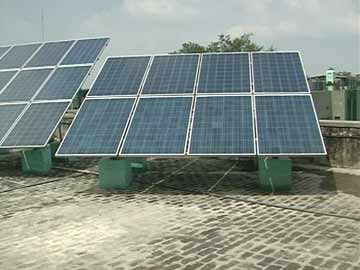
Delhi's demand for power has been increasing by 8-10 per cent.
New Delhi:
Residents of Delhi, a city struggling with power shortage, may soon find a way to generate power from the comfort of their homes.
The Delhi Electricity regulatory Commission has finalised rules that allow citizens and corporates in the capital to install solar power plants, which can not only be used to produce power but also to give back extra power to the grid.
While the details are being finalised, the decision to allow for "net metering" -- calculating the net consumption or export of power to the grid -- by a household, business or institution may be a game changer as far as solar power in the capital is concerned.
"I think it will get more people to invest in clean energy," says SY Dhavle, a retired officer of the Central Public Works Department
Mr Dhavle, who used part of his retirement fund to buy a 2 kilowatt solar power system, says, "This way, I can save more in power bills".
Business sense and the need to help the environment is what drove retired army officer P K Aggarwal to invest in a 5 kilowatt solar plant, which has been installed on the roof of his factory.
"I run a printing press which is power intensive, we use 35 kW and have a bill of Rs 70,000 every month," says Mr Aggarwal.
The retired colonel now saves over Rs 5,000 every month in power bills.
"Many factories and officers are off for a day or two every week. During those days, the solar plant produces power but there is literally no consumption. Now this can be given back to the grid, saving more energy," says Piyush Chakraborty, who designs solar power systems.
Delhi's demand for power has been increasing by 8-10 per cent every year. According to a report by non-governmental organisation Greenpeace, the capital could produce power worth 2557 MW by using only 4.4 per cent of its roof space.
The Delhi Electricity regulatory Commission has finalised rules that allow citizens and corporates in the capital to install solar power plants, which can not only be used to produce power but also to give back extra power to the grid.
While the details are being finalised, the decision to allow for "net metering" -- calculating the net consumption or export of power to the grid -- by a household, business or institution may be a game changer as far as solar power in the capital is concerned.
"I think it will get more people to invest in clean energy," says SY Dhavle, a retired officer of the Central Public Works Department
Mr Dhavle, who used part of his retirement fund to buy a 2 kilowatt solar power system, says, "This way, I can save more in power bills".
Business sense and the need to help the environment is what drove retired army officer P K Aggarwal to invest in a 5 kilowatt solar plant, which has been installed on the roof of his factory.
"I run a printing press which is power intensive, we use 35 kW and have a bill of Rs 70,000 every month," says Mr Aggarwal.
The retired colonel now saves over Rs 5,000 every month in power bills.
"Many factories and officers are off for a day or two every week. During those days, the solar plant produces power but there is literally no consumption. Now this can be given back to the grid, saving more energy," says Piyush Chakraborty, who designs solar power systems.
Delhi's demand for power has been increasing by 8-10 per cent every year. According to a report by non-governmental organisation Greenpeace, the capital could produce power worth 2557 MW by using only 4.4 per cent of its roof space.
Track Latest News Live on NDTV.com and get news updates from India and around the world

